Aware Super says asset managers’ failure to clearly explain the opportunities of agriculture is why the $3-trillion superannuation industry is largely ignoring investment opportunities in the booming sector.
Managers of large rural property and farmland portfolios may as well be speaking to super funds in a foreign language, Antoinette Masiero, a board director of the $155 billion industry fund told investors at the Agri Investor Australian Forum in Melbourne earlier this month.
“They’re not investing in agriculture because they don’t understand what you are selling them,” Ms Masiero said.
“The way you are communicating at the moment may not be the most effective way to get those doors open and to get to those meetings [with superannuation investment teams].”
Less than 1 per cent of superannuation investment is in the agricultural sector, despite prime farmland delivering double-digit returns and the value of farm production hitting a record $85 billion last financial year and on track to almost match that ($82 billion) this financial year, according to the Department of Agriculture.
Instead, much of the institutional capital coming into the farmland sector has come from offshore pension funds and global investors such as Canada’s AIMCo, which acquired Macquarie’s Lawson Grains for close to $600 million last year.
Given the extent to which agricultural assets outperformed other investments over a number of years and delivered “extraordinary” results it should be a “no-brainer” for superannuation firms, Ms Masiero told the forum.
But to get that message of outperformance across, asset managers need to learn how to communicate with super funds, to speak their language and dialect, she said.
“You are asking them to understand things from your perspective, you are asking them to understand your meta language,” she said.
There were both short-term and longer-term solutions to this problem, Ms Masiero said.
The short-term solution was for asset managers to learn about super funds and how they invest, she said.
“Find some young, keen things in your organisations and send them along to do a superannuation trustee course, not because you want them to be directors on boards, but because you want to know what [super fund] directors are looking for, and what are the rules, regulations and laws they are bound by,” Ms Masiero said.
“Those courses are not overly expensive and can be done in a week. You need to do them to get your mindset and language to change.”
The long-term strategy involved addressing “one of the real gaps” in superannuation and banking – that their investment teams did not have agricultural experts and had to get external advice from an intermediary, often a fund manager, when opportunities arose.
“So your long-term strategy is to invest in getting ag-clever people into the investment teams in superannuation funds,” she said.
“Talk to those super funds, say ‘this is our plan, can we do a collaborative scholarship to get some of our ag experts into these finance fields?’ Super funds are going to go ‘Yay’, and grab it with both hands because they want that direct understanding and knowledge,
“And you will be able to inculcate those experts into those [superannuation] firms, so in five years’ time you are not going to have trouble getting the phone calls answered, or the meeting organised because they are going to be chasing you.”
